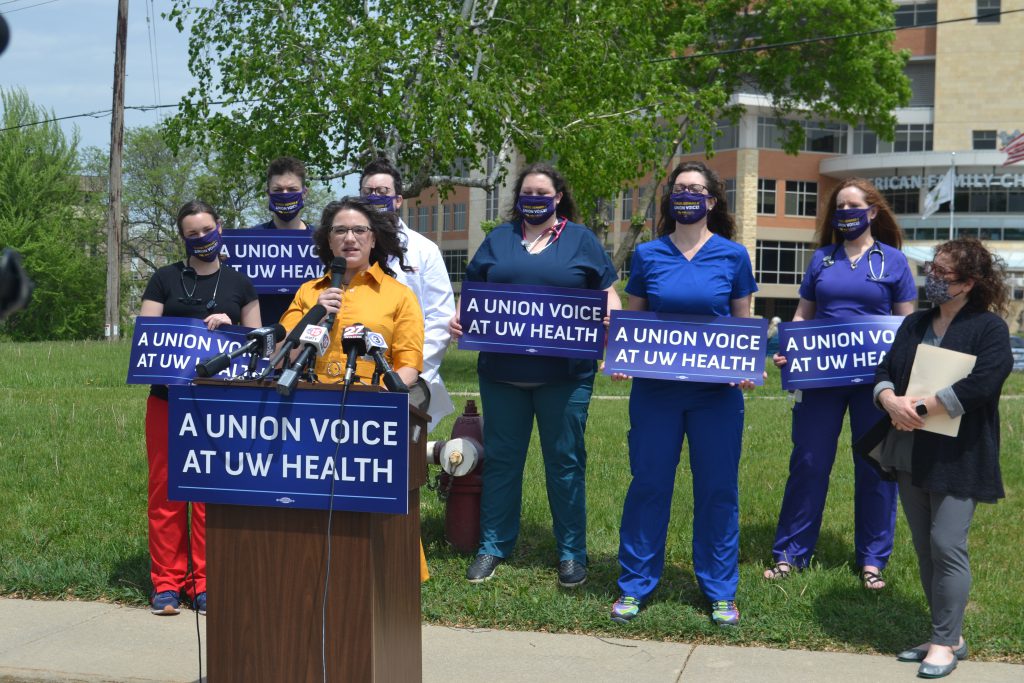Bill Gives Union Rights to UW Health Staff
Nurses demand collective bargaining rights, but GOP legislators may balk at overriding Act 10.

Sen. Melissa Agard speaks Thursday at a news conference promoting legislation she and Rep. Lisa Subeck, far right, plan to introduce that would restore collective bargaining rights at UW Health. Nurses and their supporters in the health care system stand behind. Photo by Erik Gunn/Wisconsin Examiner.
Two lawmakers are circulating draft legislation that would restore collective bargaining rights that employees at University of Wisconsin Hospital & Clinics Authority lost with the passage of Act 10 a decade ago.
The legislation is the latest step in a union organizing campaign by nurses employed by UW Health that launched in late 2019 and has been ramped up again after a year on the sidelines because of the COVID-19 pandemic.
Agard and Rep. Lisa Subeck (D-Madison) sent out a memo Thursday seeking cosponsors for the legislation, which they expect to introduce in early June.
This bill “gives our nurses a critical voice in their workplace,” said Subeck. “Our nurses who have critical medical expertise can and should have a strong voice in their workplace at UW Hospital and Clinics. The quality of care that we receive depends on that.”
The proposed legislation is limited to UW Health. It would restore collective bargaining rights for UW Hospital & Clinics Authority employees that were abolished as part of Act 10 — the law introduced early in former Gov. Scott Walker’s first term curbing the collective bargaining rights of all public employees in Wisconsin except for police officers and firefighters.
‘Keeping us safe’
While Act 10 allows the public workers it covers to form unions, it limits their role to only negotiating wages, and only up to the rate of inflation. But for the UW Health employees, the law eliminated collective bargaining rights entirely. Those rights had been written into the 1996 legislation that first established the UW Hospital & Clinics Authority, separating the health care system from the University of Wisconsin.
Act 10’s effect on UW Health employees wasn’t a secret, and it became more widely known when the health system’s existing labor contracts expired in 2014. But Agard said in an interview that during Act 10 protests in early 2011, the way the Walker legislation treated UW Health workers was obscured by the intense focus on government employees, especially teachers.
The nurses’ union campaign gathered steam in the first couple of months of 2020. At Thursday’s news conference, Agard said that “they set that aside” when the COVID-19 pandemic hit in March 2020, focusing instead on their jobs as health care workers “to work for the greater good of protecting our community and all of us, and keeping us safe.”
Nurses who appeared Thursday with Agard and Subeck said the pandemic exposed and exacerbated the problems that had led them to seek union representation in the first place.
“Because hospital administrators did not involve bedside nurses in any meaningful way when making decisions during the pandemic, we were left in the dark about constantly changing directives,” said Tami Burns, an RN in the UW Hospital vascular unit. “The administration would constantly implement new and inefficient policies around staffing, training, personal protective equipment, and other areas that were counter to the health and safety of workers and patients.”
The problems that nurses confronted during the pandemic “were not caused by COVID-19,” said Courtney Maurer, a nurse in the cardiac intensive care unit. “The pandemic simply exposed deep issues with UW nurses.”
Shared governance skepticism
After losing union representation in 2014, the nurses have gone through changes that Maurer said had a negative impact on the staff as well as on the community. “Worsening staff-to-patient ratios,” she said, have made it “much more difficult to provide patients with the personalized quality care that they deserve.”
Maurer said she served as a chair for several years of an employee council that was part of the UW Health “shared governance” program and met with hospital system leaders and executives.
“Nurses are trained to act as patient advocates,” she added, calling for passage of the legislation. “But without a union, we have no way to ensure that the voices of frontline caregivers are taken into account.”
Mariah Clark, another UW nurse, said that while the legislation “doesn’t address nursing shortages directly,” it would make the hospital system more attractive to prospective employees. By enabling the nurses and other health care workers to organize and bargain collectively, she said, it would improve staff satisfaction, retention and recruitment.
As the nurses’ union organizing project resumed this spring, Gov. Tony Evers included language in his 2021-2022 state budget proposal that would have rolled back Act 10 limitations on bargaining rights. The expanded labor rights were among measures that the Republican majority on the Legislature’s Joint Finance Committee deleted from the budget legislation early in May. Agard and Subeck said their bill was drawn up in response.
At a rally in front of the Capitol on May 8, Evers was among the speakers who called for extending union rights to health care workers in general and UW Health employees in particular.
UW Health responds
Responding Thursday to the legislation, UW Health sidestepped public confrontation with either the union or lawmakers.
“We appreciate the work of Gov. Evers and our local legislative leaders to debate this issue in the appropriate legislative forum,” said spokeswoman Emily Kumlien in a statement Thursday afternoon. “UW Health has always followed state laws on collective bargaining, pre- and post-Act 10, and will follow any new direction provided by the legislature.”
The statement also promoted the health system’s approach to enlisting employee participation — the approach that nurses who favor a union have criticized from the outset of their campaign.
“What will never change is our commitment to working together with our nurses and all care providers directly and collaboratively to meet the needs of our patients,” Kumlein stated. “That robust system of collaboration and shared governance is part of what makes UW Health a great place to work and a place our patients receive truly remarkable care.”
Agard and Subeck said they would welcome Republican participation as cosponsors for their bill — a prospect that appears unlikely considering the role of the majority party’s lawmakers not only in curbing union rights under Act 10 and other Walker-era legislation, but also in tossing out Evers’ budget items to restore union rights.
An informal option?
In her interview with the Wisconsin Examiner, Agard acknowledged the possibility that the legislation would go no farther than being introduced.
“As a member of the minority party for all of my time in the Legislature, I would argue that it is vitally important that we hear the voices of the people of the state of Wisconsin,” Agard said. “It’s absolutely egregious that my Republican colleagues are closing down conversations,” she added, particularly on policies that the majority of state residents support. “We need to be illustrating what it is that good representation looks like.”
A memo Thursday from the nonpartisan Legislative Council that Agard requested indicates that, even without a legal change, UW Health could legally engage in voluntary and nonbinding discussions with the union over policies and practices.
At the start of the union campaign, acknowledging that they don’t currently have collective bargaining rights, the nurses said they were seeking that sort of informal arrangement. UW Health, however, drew no distinction between a voluntary process and full collective bargaining and rejected it as unlawful.
While the bill she’s circulating with Subeck would reinstate full collective bargaining rights, Agard said the Legislative Council memo supports the legality of the informal process now.
“They don’t need this bill to pass to do that,” she said. “They could decide tomorrow that that’s a good idea.”
Reprinted with permission of Wisconsin Examiner.






















These people are still complaining about act 10? That was over a decade ago, time to move on with your lives and focus on doing the best job you can do everyday.
Mr. Cotic, we (public employees) DID move on- and we CONTINUED to do the best job we could do. But Act 10 has cost all of us and we won’t forget. We will continue to fight for economic and workplace justice and against scumbag pols like Walker and his ilk. It is a sad situation that the home of Fighting Bob LaFollette and John Commons is a right-to- work state. We WILL be back!